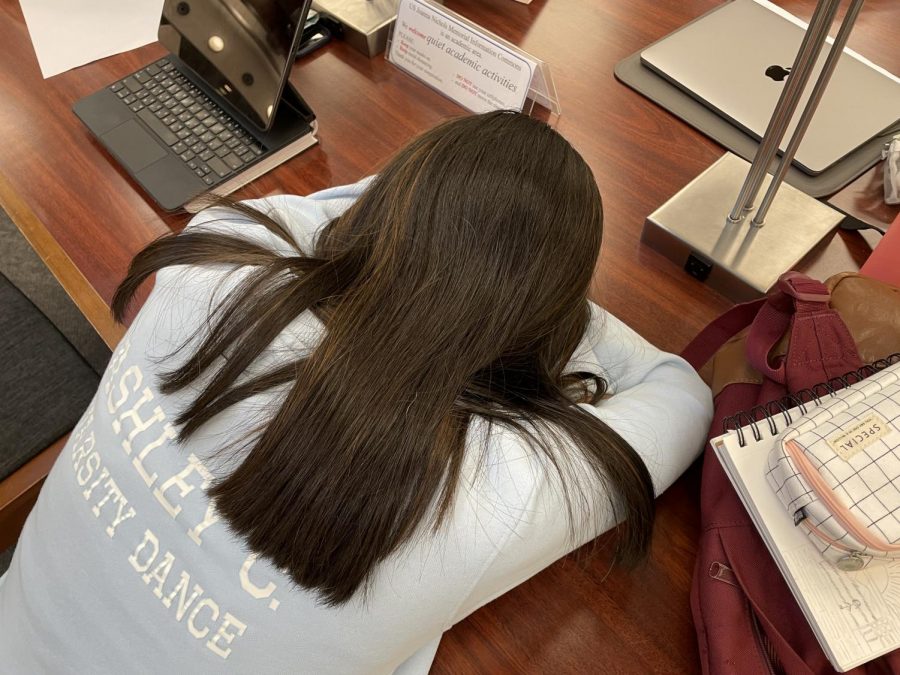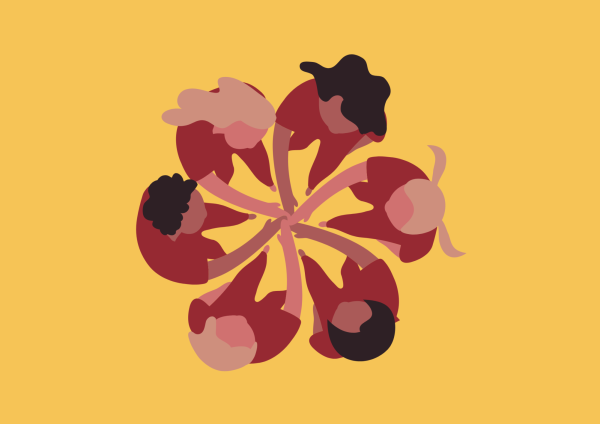Why do Taipei American School students not get enough sleep?
Students often take naps during their breaks in order to perform better academically since they lack sleep.
The topic of students not getting enough sleep has been a long-term and rather controversial discussion at Taipei American School (TAS), where students often assert that the root cause of their lack of sleep is the excessive homework load.
The National Sleep Foundation suggests that students above the age of 13 should receive more than eight hours of sleep each night. However, on an Instagram poll conducted by The Blue & Gold, the average amount of sleep a TAS student receives is six hours.
Many adults state that electronics such as smartphones, laptops, tablets and other devices are the main cause of students not getting enough sleep as the amount of time they spend on their devices pushes back their bed time; however, many upper school students disagree with this statement.
Students believe that they are forced to reduce their hours of sleep in order to prevent their grades from slipping. “Large amounts of homework or tests often can overload students,” Caleb R. (‘22, he/him), who gets an average of five hours of sleep a night, said. “However, grade deductions and other such consequences force the student to sacrifice health for the grade.”
Vanessa H. (‘23, she/her) states that she still pulls multiple all-nighters despite putting her phone away after school. “There are a couple of weeks where teachers would put many tests on the same day and increase the homework load,” she said. “Which causes me to not get enough sleep even though I don’t bring my phone into my room.”
Even if teachers limit the amount of homework on one specific day as an attempt to help students get more rest, their bodies will not align with their circadian rhythms, the internal biological clock that manages our sleep-wake cycles, preventing them from falling asleep at an earlier time.
“Homework is why I don’t get enough sleep,” Dylan L. (‘23, he/him), who gets seven hours of sleep, said. “And even if I have less homework on a certain day, my body is already used to a certain sleep schedule, which makes it hard to fall asleep.”
For students to actually get the amount of sleep that they need, the action of minimizing homework load is necessitated in order for students to sleep more, instead of piling homework on one single day just to allow students to get a more relaxing long weekend. Teachers can do this by eliminating the information that ends up not getting tested, which will allow homework load to significantly decrease.
Students have come up with various solutions that the administration could enforce to allow students to get the sleep they need, including a “homework log” system. “I think a ‘homework log’ system in which students insert the amount of time they work on homework can help teachers realize that we’re spending a lot of time on tasks they think we spend a little time on can help,” Vanessa said.
Guan C. (‘23, he/him), class of 2023 officer, is starting an initiative to help underclassmen lessen their stress through having discussions about sleep, time management, work environment and more. “Although we are still discussing the format, we truly believe this initiative can better prepare underclassmen as they navigate through high school at TAS,” Guan said. “[Students should] be on the lookout for future announcements.”
The administration has also discussed putting a limit on the rigorous Advanced Placement (AP) and International Baccalaureate (IB) courses in hopes of helping students minimize their workload due to their concern about balance and time management. “To me, it makes a whole lot of sense to put limits on the number of certain types of courses students can take,” Mr. Andrew Lowman (he/him), the upper school principal, said. “Such as telling students ‘you’re only allowed this many AP classes, or this many AP and honors classes,’ which TAS has never done.”
Ultimately, although electronics can play a huge role in preventing students from getting more sleep, the immoderate homework load remains as the main source to the issue.

Amber is the co-editor-in-chief of The Blue & Gold. She has lived in Taiwan her entire life and has been at TAS since first grade. When she is not...


![A collection of college flags. [PHOTO COURTESY OF AMBER HU ('27)]](https://blueandgoldonline.org/wp-content/uploads/2025/05/IMG_5029-600x289.jpeg)

![An SAT word cloud. [PHOTO COURTESY OF WORDCLOUDS]](https://blueandgoldonline.org/wp-content/uploads/2025/05/SAT-600x600.jpeg)
![Collage of banned books, including “The Handmaid’s Tale” by Margaret Atwood. [MINSUN KIM/ THE BLUE & GOLD]](https://blueandgoldonline.org/wp-content/uploads/2025/04/IMG_4274-600x340.jpeg)
